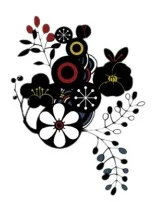
The Yakuza, often dubbed the "Japanese Mafia," is a traditional form of organized crime in Japan, holding a dominant position in the country's criminal underworld.
This article provides a comprehensive exploration of the Yakuza, its origins, structure, activities, and its unique characteristics that set it apart from other global criminal organizations.
{tocify} $title={Table of Contents}
Origins of Yakuza
The term "Yakuza" traces back to the group of card players known as "Bakuto," named after a combination in the card game 'Oicho-Kabu'.
Oicho-Kabu is a traditional Japanese card game played with Hanafuda cards. The goal is to get a hand value as close to nine as possible without going over. It involves strategy, and bluffing, and is often played for gambling.{alertInfo}
In Japanese, "Ya" translates to "eight", "ku" which means "nine", and "za" is a modified version of "san" or "three".
The total, twenty, is the worst number in this game.
Initially, "Yakuza" represented a "worthless thing", further translating into a "useless person".
As Bakuto were considered outcasts and failures, they began to associate themselves with this losing card combination.
Over time, "Yakuza" expanded its usage, not only to Bakuto but to all Japanese organized crime groups, and continues to be used today.
Yakuza's Historical Timeline
The Yakuza, also known as gokudō, is a notorious organized crime syndicate originating in Japan.
With a complex history spanning over a century, the Yakuza have become deeply ingrained in Japanese society and have garnered significant attention worldwide.
This historical timeline provides a brief overview of key events and developments in the Yakuza's evolution.
Feudal Japan and the Emergence of Yakuza
During the feudal era, Japanese lords often resorted to employing the Yakuza for covert operations while maintaining their inconspicuous and low-profile identities.
The structure, traditions, and laws of the Yakuza primarily developed during the Edo period (1603--1868).
The forerunners of the modern Yakuza were the Tekiya (peddlers) and Bakuto (gamblers) groups that emerged in the 17th century.
Bakuto and Tekiya: The Yakuza's Forebears
The Bakuto groups primarily consisted of the vassals of the Tokugawa house who lost their lands and wealth at the shogun's whim, along with numerous Ronin (masterless samurai).
Over time, they transformed into wandering merchants, petty thieves, extortionists, and swindlers, operating under the guise of their portable stalls on streets and fairs held near monasteries during major religious festivals.
The Tekiya was known to worship the god Shennong, whose altars can still be found in Yakuza homes today.
The First Boss and The First War
The first verifiable Yakuza leader in Japanese history was a former samurai, Banzuiin Chōbei, who lived in the 17th century.
After losing the patronage of a feudal lord, he moved to the rapidly developing city of Edo and opened a gambling house.
Soon, the city authorities appointed Chobei as the supervisor in charge of hiring labor for road construction and repair of the Edo castle walls.
The First Half of the 20th Century
The economic crisis that gripped Japan's economy in the early 1930s led to mass unemployment, workers' strikes, and peasant unrest.
To prevent an explosion of public rage, the authorities decided to turn a blind eye to the proliferation of illegal entertainment and exotic shows.
Soon, numerous gambling dens, brothels, and new movie theaters, where sound films were shown, fell under Yakuza's control.
For those who want to know more about the history of the Yakuza in depth.
Here is the article explaining the history of the Yakuza from the past to the present day.
If you are interested in yakuza culture and the origins of the organization, please click to learn more.
Structure of the Yakuza
Despite their criminal nature, the Yakuza operate on a strict hierarchical system reminiscent of a patriarchal family.
This structure, composed of complex vertical and horizontal relationships, ensures the longevity and stability of Yakuza clans.
Oyabun-Kobun Relationship
One distinctive feature of the Yakuza's structure is the "Oyabun-Kobun" relationship, which translates to "parent-child".
The Oyabun (boss) commands absolute loyalty from the Kobun (underlings).
This bond is established through a ceremony called "Sakazuki", a sake-sharing ritual symbolizing a father-son relationship.
New members must renounce their blood relatives, pledging allegiance to the Oyabun and the Yakuza family.
Rituals and Practices Among the Yakuza
An integral part of the Yakuza tradition is the Yubitsume, or finger-shortening, a form of penance or apology.
Yakuza members demonstrate their loyalty and sincerity to their Oyabun by amputating the joints of their little fingers.
Yakuza's Influence on Japan's Economy and Political Life
The Yakuza is intricately woven into the economic and political life of Japan.
Unlike other global criminal entities, the Yakuza does not have defined territorial zones of influence.
They do not rely on familial relationships as a structural basis for their organization and do not strive to keep their internal hierarchy, membership, or leadership composition a secret.
Yakuza in Popular Culture
The Yakuza has been a popular subject in various forms of media, including films, television, and literature.
These portrayals often romanticize the life of a Yakuza member, focusing on their strict code of honor and loyalty, and their willingness to defend the weak and the innocent.
The Future of Yakuza
Despite the measures taken by the Japanese government to curb the Yakuza's influence, they continue to adapt and persist.
As the Yakuza evolve to withstand legal pressures and societal changes, their future remains uncertain.
The Yakuza, with their intricate hierarchy, distinct traditions, and impactful influence on Japanese society, represents a unique facet of Japan's underworld.
While they may bear similarities to other organized crime groups worldwide, their unique characteristics and deep-rooted history set them apart.
As they continue to adapt and evolve, the Yakuza's role in Japan's future remains to be seen.

Your Gateway to Japan's Wonders! Immerse yourself in the beauty, culture, and adventures that Japan has to offer.
Check It Out!

Post a Comment